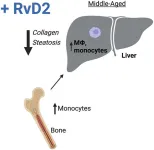(Press-News.org) SAN ANTONIO – For patients whose breast cancer converted from lymph node-positive to lymph node-negative disease after neoadjuvant chemotherapy, skipping adjuvant regional nodal irradiation (RNI) did not increase the risk of disease recurrence or death five years after surgery, according to results from the NRG Oncology/NSABP B-51/RTOG 1304 clinical trial presented at the San Antonio Breast Cancer Symposium, held December 5-9, 2023.
Patients who are diagnosed with breast cancer that has already spread to regional lymph nodes may receive neoadjuvant chemotherapy; in some cases, neoadjuvant therapy completely eradicates the cancer from the lymph nodes. Currently, there is no established standard of care for how these patients should be treated after surgery, according to Eleftherios (Terry) Mamounas, MD, MPH, chair of the NRG Oncology Breast Committee, professor of surgery at the University of Central Florida and medical director of the Comprehensive Breast Program at the Orlando Health Cancer Institute.
“There is an active debate on whether these patients should be treated as patients with lymph node-positive disease (which is how they were diagnosed) or as patients with lymph-node negative disease (which is how they present at the time of surgery),” he said.
If treated as patients with lymph node-positive disease, they would be recommended to undergo chest wall irradiation plus RNI after mastectomy or whole breast irradiation plus RNI after breast-conserving surgery. Alternatively, if their disease were considered lymph node-negative, they would be eligible to omit RNI after surgery.
RNI is a form of radiotherapy directed to lymph nodes near the breast; it is intended to reduce patients’ risk of disease recurrence after surgery.
“Some patients may prefer to skip RNI to avoid complications associated with the treatment, such as pain, fatigue, lymphedema, and its impact on breast reconstruction,” noted Mamounas. “Therefore, it is important to evaluate whether this treatment can be safely omitted in this patient population.”
To evaluate the impact of RNI on patient outcomes, Mamounas and colleagues conducted the NRG Oncology/NSABP B-51/RTOG 1304 phase III clinical trial. The study enrolled 1,641 patients diagnosed with lymph-node positive, nonmetastatic breast cancer whose lymph nodes were found to be cancer free after neoadjuvant chemotherapy and who had undergone either mastectomy or breast-conserving surgery.
Patients were randomly assigned 1:1 to either the “no RNI” arm (observation after mastectomy or whole breast irradiation after breast-conserving surgery) or the “RNI” arm (chest wall irradiation plus RNI after mastectomy or whole breast irradiation plus RNI after breast-conserving surgery).
Evaluable patients (1,556 patients) had similar outcomes whether they received adjuvant RNI or not: 91.8% of patients in the “no RNI” arm and 92.7% of those in the “RNI” arm were free of invasive breast cancer recurrences five years after surgery. Distant recurrence and overall survival rates were also similar between the arms, with 93.4% of patients in each arm free from distant recurrence five years after surgery, and 94% of those in the “no RNI” arm and 93.6% of those in the “RNI” arm alive after five years.
“Our findings suggest that downstaging cancer-positive regional lymph nodes with neoadjuvant chemotherapy can allow some patients to skip adjuvant RNI without adversely affecting oncologic outcomes. Follow-up of patients for long-term outcomes continues,” Mamounas summarized.
A potential limitation of the study is that patients have so far experienced fewer breast cancer recurrences than expected, which impacted the researchers’ ability to perform the planned statistical analyses based on the number of recurrences. However, the statistical plan of the study also stipulated analyses 10 years after the initiation of the study, which was reached in 2023. The researchers have planned a longer follow-up to strengthen their analysis.
The study was supported by the National Cancer Institute of the National Institutes of Health. Mamounas has served as a consultant for Genentech, Merck, Exact Sciences, TerSera Therapeutics, Biotheranostics Inc., and Sanofi; has been on the speaker’s bureau for Genentech, Merck, and Exact Sciences; and owns stock in Moderna.
END
Neoadjuvant chemotherapy may help some breast cancer patients skip regional nodal irradiation
Treatment de-escalation may be an option for patients whose lymph nodes become cancer free after neoadjuvant treatment
2023-12-06
ELSE PRESS RELEASES FROM THIS DATE:
Study: diverse college classrooms linked to better STEM learning outcomes for all students
2023-12-06
Washington, December 6, 2023—Students achieve better grades in college science, technology, engineering, and math (STEM) courses when those classrooms have higher numbers of underrepresented racial-minority and first-generation college students, according to new research released today. The findings were published in AERA Open, a peer-reviewed journal of the American Educational Research Association.
While this link holds true for all students, it is even stronger for students who are underrepresented racial minorities (URMs) and the first in their family to attend college. The authors found that in STEM courses ...
Repeated blast exposures may harm the brain health of military personnel
2023-12-06
The brains of special warfare community personnel repeatedly exposed to blasts show increased inflammation and structural changes compared with a control group, potentially increasing the risk of long-term, brain-related disease, according to a new study.
Researchers from the University of Virginia School of Medicine and Naval Medical Research Command (NMRC) led the study, which compared the brains of nine special operations personnel exposed to blasts with a control group of nine military service members with only minimal exposures to blasts. Participants’ brains were analyzed using sophisticated imaging techniques, combined with surveys ...
New findings reveal important insights into age-related nonresolving inflammation
2023-12-06
Philadelphia, December 6, 2023 – Aging is associated with chronic, nonresolving inflammation, or “inflammaging,” that can lead to tissue dysfunction. New findings reported in The American Journal of Pathology, published by Elsevier, reveal insights into the cellular programs and factors that promote the resolution of inflammation during aging. These findings may lead to the development of new strategies to limit age-related organ decline.
The resolution of inflammation is an active process that is governed by numerous factors, such as specialized ...
JAMA Editor in Chief Dr. Kirsten Bibbins-Domingo named one of Modern Healthcare’s 100 Most Influential of 2023
2023-12-06
Kirsten Bibbins-Domingo, Ph.D., M.D., M.A.S.., Editor in Chief of the Journal of the American Medical Association (JAMA) and the JAMA Network™ has been named as one of Modern Healthcare’s 100 Most Influential People in Healthcare 2023 for the second year in a row.
This program acknowledges and honors individuals who are deemed by their peers and the senior editors of Modern Healthcare to be the most influential figures in the industry in terms of leadership and impact.
"It’s an honor to be recognized for two consecutive years by Modern Healthcare," ...
Model uses sociodemographic factors to predict aromatase inhibitor non-adherence risk
2023-12-06
A new risk model uses baseline sociodemographic and financial measures to predict which patients prescribed long-term therapy with aromatase inhibitors for breast cancer are at significantly higher risk of stopping that therapy early (non-adherence).
The work will be presented in a poster spotlight discussion session at the 2023 San Antonio Breast Cancer Symposium (SABCS) on Wednesday, December 6th.
The authors analyzed data from the SWOG S1105 clinical trial, including measures of patient adherence to aromatase inhibitor (AI) therapy for hormone-sensitive breast cancer. They created a model ...
Newly developed floating trash interceptor cleans up the river
2023-12-06
To reduce marine debris, which causes serious environmental pollution in the sea, researchers at the Korea Institute of Civil Engineering and Building Technology (KICT, President Kim, Byung-suk) have developed a technology for reducing floating debris in rivers.
Since the river is the main transportation channels for land-originated marine debris, the research team led by Dr. Sang Hwa Jung launched a living lab project involving local governments, local citizens, and experts.
Chungcheongnam-do (also ...
Morressier and senior leaders from academic publishing form Strategic Advisory Board to stimulate positive change in scholarly communications industry
2023-12-06
Berlin, Germany, and Washington, D.C., December 6, 2023 – Morressier, the company transforming scholarly communications, today announced the formation of a new Strategic Advisory Board composed of the most senior leaders from across the scholarly communications community. The Board, which is facilitated and supported by Morressier, will act as a lively, critical, and direct forum, stimulating innovation and collaboration across the industry on crucial issues such as research integrity and publishing workflows.
The ...
NIH awards $9 million for Indigenous-led Tribal Data Repository to improve community health in response to COVID-19 pandemic
2023-12-06
In an effort to improve the health of Tribal communities and Indigenous people, the National Institutes of Health (NIH) has awarded $9 million in funding for Native scientists at Arizona State University and elsewhere to create the first Indigenous-led Tribal Data Repository.
Since the SARS-CoV-2 worldwide pandemic began, global Indigenous communities have been particularly hard hit, with health disparities including lack of access to health care and undue burden of infections leading to increased hospitalizations and higher death rates.
In response, Indigenous researchers and scientists have been working to secure and fund efforts to better understand the impact of COVID-19 and ...
Fascicle gearing dynamics: Unveiling 3D rotation effects in muscle elongation
2023-12-06
Detailed insights into muscle and tendon movement mechanisms during stretching are essential to improve our overall mobility and flexibility. It is not only important for optimum athletic performance, but also crucial for preventing musculoskeletal injuries. When an individual stretches, 50% to 70% of the elongation is absorbed into the muscle belly, i.e., the fleshy part of the muscle containing most fibers.
However, in skeletal muscles with fascicles, the muscle fibers are shorter than the muscle belly and attach to the tendon at an angle. This angle between the fascicles and the tendon changes in response to the length of the muscle belly ...
Greenhouse gases in oceans are altered by climate change impact on microbes – an Incheon National University study
2023-12-06
The ocean is a critical life-support system for our planet through its role in global climate regulation. It absorbs most of the carbon emissions and heat trapped in the atmosphere which are a result of human activities. Over the years, this has led to ocean warming (OW), ocean acidification (OA), and ocean deoxygenation (OD). Moreover, increased anthropogenic‑nitrogen-deposition (AND) has largely influenced marine environments. As part of these consequences, the gases nitrous oxide (N2O) and methane (CH4) are largely controlled by 'prokaryotes’ or microbial organisms living in the ocean. While several studies have analyzed ...
LAST 30 PRESS RELEASES:
Power in motion: transforming energy harvesting with gyroscopes
Ketamine high NOT related to treatment success for people with alcohol problems, study finds
1 in 6 Medicare beneficiaries depend on telehealth for key medical care
Maps can encourage home radon testing in the right settings
Exploring the link between hearing loss and cognitive decline
Machine learning tool can predict serious transplant complications months earlier
Prevalence of over-the-counter and prescription medication use in the US
US child mental health care need, unmet needs, and difficulty accessing services
Incidental rotator cuff abnormalities on magnetic resonance imaging
Sensing local fibers in pancreatic tumors, cancer cells ‘choose’ to either grow or tolerate treatment
Barriers to mental health care leave many children behind, new data cautions
Cancer and inflammation: immunologic interplay, translational advances, and clinical strategies
Bioactive polyphenolic compounds and in vitro anti-degenerative property-based pharmacological propensities of some promising germplasms of Amaranthus hypochondriacus L.
AI-powered companionship: PolyU interfaculty scholar harnesses music and empathetic speech in robots to combat loneliness
Antarctica sits above Earth’s strongest “gravity hole.” Now we know how it got that way
Haircare products made with botanicals protects strands, adds shine
Enhanced pulmonary nodule detection and classification using artificial intelligence on LIDC-IDRI data
Using NBA, study finds that pay differences among top performers can erode cooperation
Korea University, Stanford University, and IESGA launch Water Sustainability Index to combat ESG greenwashing
Molecular glue discovery: large scale instead of lucky strike
Insulin resistance predictor highlights cancer connection
Explaining next-generation solar cells
Slippery ions create a smoother path to blue energy
Magnetic resonance imaging opens the door to better treatments for underdiagnosed atypical Parkinsonisms
National poll finds gaps in community preparedness for teen cardiac emergencies
One strategy to block both drug-resistant bacteria and influenza: new broad-spectrum infection prevention approach validated
Survey: 3 in 4 skip physical therapy homework, stunting progress
College students who spend hours on social media are more likely to be lonely – national US study
Evidence behind intermittent fasting for weight loss fails to match hype
How AI tools like DeepSeek are transforming emotional and mental health care of Chinese youth
[Press-News.org] Neoadjuvant chemotherapy may help some breast cancer patients skip regional nodal irradiationTreatment de-escalation may be an option for patients whose lymph nodes become cancer free after neoadjuvant treatment






